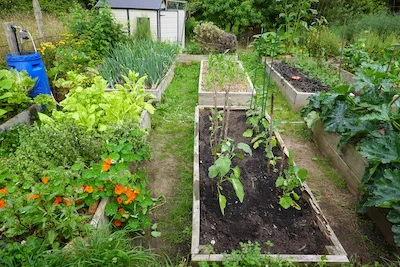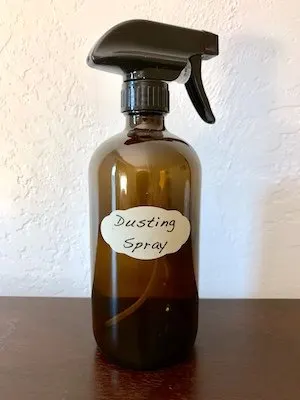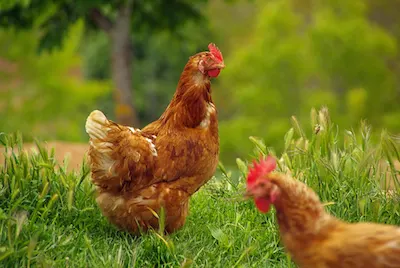Homesteading Skills to Learn While You Wait for Your Farm
In today’s modern world, the simple and self-sustaining practice of homesteading is gaining popularity. If you’re interested in homesteading in the future, there are a variety of homesteading skills to learn while you wait.
Like plenty of other people, my husband and I dream of owning our own homestead. However, between a child in school, jobs, and aging parents who need our help, it’s not an option that’s currently available to us.
But that doesn’t mean we can’t start practicing the homestead skills we’ll need to learn right now.
Whether you live in the suburbs or an apartment, these are the homestead skills you can start learning so you’ll be prepared for your future homestead.
Why Practice These Homestead Skills to Learn?
If you interview 500 different homesteaders and ask them why they decided to start homesteading, you’ll likely receive 500 different answers.
For some people, it’s all about leaving behind the stress of modern society and living a simpler life. For others, it’s about being more self-sufficient. Some want to reduce their environmental impact, and others have a combination of all of these.
Related: How to Have a Flourishing Homestead on Just 1 Acre
If you dream about having your own homestead someday, you know it will require a lot of work and specialized skills that we often don’t learn in modern times. The good news is that if you’re building toward your dream, you have time to practice many of these skills right now by starting an urban homestead.
Getting better at these homesteading skills to learn today will give you a head start when you actually do have your own homestead in the future.
1. Gardening

Not only does gardening offer a variety of amazing benefits, I believe it’s one of the most important homesteading skills to learn right away. When you homestead, you don’t want to rely on a grocery store to provide the food you need. Instead, you want to grow as much of your own food as possible.
Related: What You Need to Know About Zero Waste Grocery Shopping
Fortunately, gardening isn’t terribly hard to learn. If you have no idea where to begin, check out this post on how to start a garden for beginners and this post about the best plants for beginner gardeners. You can also start getting food on your table right away when you plant some of these fast growing vegetables.
To get your garden started, you’ll want to begin by finding out your USDA Hardiness Zone. This will help you determine what type of fruits and vegetables will grow in your area and when you can plant certain items.
I live in Florida, so I’ve learned that it’s best for me to grow plants that prefer cool weather — such as spinach, broccoli, and carrots — in the fall and winter. I leave vegetables that can handle the heat — like green beans, peppers, and eggplant — for the summer.
Related: Must-Have Subscription Boxes for Gardeners
If you live in the suburbs and have some space in your backyard, consider installing a few raised beds so you can start gardening. If you have a small backyard or live in an apartment, look for plants that you can grow in a pot. Good options include peas, potatoes, tomatoes, and most herbs.
If you have zero outdoor space where you can place some pots, look into local community gardens. A community garden is a piece of land where you can buy a plot and start honing your gardening skills. Or you can check out this guide on how to start an indoor garden and grow food right inside your own house.
Don’t forget, your kids can also learn how to garden and help you get food on the table when you choose some of these best plants for a children’s garden.
Related: The Best Tools for Gardeners
2. Foraging
In addition to gardening, foraging is another way you’ll be able to get the food you need when you homestead. When you forage, you head out into the wild to look for berries and mushrooms you can eat. You can also forage for plants to help make herbal remedies (more on that a little further down).
Since there are poisonous berries, mushrooms, and plants out there, knowing how to identify the right ones is incredibly important!
There are a variety of online foraging classes you can take. If you’re interested in something more hands-on, you can also check with your local nature centers and botanical gardens to see if they offer any classes.
Related: The Easiest Fruit Trees to Grow in Your Yard
3. Preserving
Once your garden starts producing, you’re going to need a way to make sure all of your fresh food doesn’t go to waste. That’s why preserving is another important homesteading skill to learn right away.
There are a variety of ways you can practice preserving, including freezing, dehydrating, pickling, water bath canning, pressure canning, and fermenting. If you plan on raising livestock on your homestead, you can also learn how to smoke or salt cure meat.
If you have a small garden that produces just enough food and you don’t have any surplus to preserve, consider buying some fruits and vegetables in bulk so you can start practicing.
4. Scratch Cooking
In addition to preserving food from your garden, you’ll also want to learn how to cook from scratch so you can put everything you grow to good use. There are two cookbooks I used to start learning how to cook from scratch that I highly recommend.
The first is The Complete Vegetarian Cookbook. The reason this cookbook is such a good option is because it has 700 plant-based recipes that use simple and practical ingredients. Many of these ingredients were items I was already growing in our garden.
The other cookbook I used was From Scratch: Easy Recipes for Traditionally Prepared, Whole-Food Dishes by Shaye Elliott. This cookbook shows you how to prepare traditional and nutritious food using simple and natural ingredients.
5. Cooking With Cast Iron
I’ll admit that cast iron cookware was one of those things that intimidated me for a very long time. However, once I took the plunge and learned how to care for cast iron cookware, I realized my fears were unfounded.
Cast iron cookware has several benefits over nonstick cookware. Not only is there still plenty of controversy over whether or not nonstick cookware is safe, but you also continually have to buy new ones every time the nonstick coating eventually wears off. When you make the switch to cast iron cookware, you’ll never have to purchase another skillet again, which will help you save money.
If you don’t have any cast iron cookware yet, this is the cast iron skillet I use and highly recommend. It’s a convenient size, comes from a dependable company, and is made in the USA.
Related: The Safest Nonstick Cookware for Healthier Meals
6. Composting

On a homestead, nothing should go to waste. That’s why you need to learn how to compost. When you compost, you take food scraps and turn them into dirt that you can then put right back into your garden.
Depending on how much space you currently have, there are several ways you can begin composting.
We don’t have a ton of free space in our backyard, so we use this compost tumbler. It has two chambers, so one side can finish composting while you add scraps to the other side. The tumbling design also makes it easy to rotate without having to dig by hand.
If you have the space, you can create your own freestanding compost heap. Then you simply need a digging fork or rake to stir the pile.
No matter which design you choose, I highly recommend getting a small compost bin that you can leave on your countertop. Then you simply toss in the food scraps as you’re cooking and empty it into your compost tumbler or pile when it’s full.
7. Making Homemade Cleaning Products

Homesteading is all about being self-sufficient. You want to be able to make and do as much as possible for yourself, and this includes making your own cleaning supplies.
Making your own cleaning supplies offers a variety of benefits aside from just self-sufficiency. Many store-bought cleaning supplies contain toxic chemicals that can harm your health and the health of your family.
On the other hand, homemade cleaning supplies typically require simple and natural ingredients that are safer yet just as effective. They’re also cheaper, which can help you save money.
If you need some help getting started, here are a few popular homemade cleaning supplies you can start making today:
- Homemade Toilet Cleaning Tablets
- Homemade Laundry Detergent
- DIY Hardwood Floor Cleaner
- Homemade Tile Floor Cleaner
- Homemade All-Purpose Cleaner
8. Making Soap
Not only do you need to make sure that your house stays clean when you’re homesteading, but you also want to keep yourself clean. That’s why making your own soap is another important homesteading skill to learn.
When you learn how to make soap, you can make multiple bars of soap for the price of one, which helps you save money. You can also create soap that’s specific to your own needs.
This homemade lavender loofah soap offers a fantastic exfoliation. When the soap is gone, you can then compost the loofah, which also makes it a great zero waste option. You can also learn how to make this homemade massaging shampoo bar to help get your hair clean.
9. Making Natural Health and Beauty Products
Along with soap, you’ll also want to learn how to make other natural health and beauty products. This is a skill that will assist you now and in the future.
Right now, making your own health and beauty products will help you eliminate some of the harmful hidden chemicals in store-bought products that can hurt your health and the environment.
When you have your own homestead, knowing how to make health and beauty products will help you become less reliant on stores and reduce the number of times you actually have to go to a store.
This skill will also help you save money, which is always important no matter where you are on your homesteading journey.
This homemade shaving gel and this homemade coffee scrub that helps reduce the appearance of cellulite are both great places to begin when you’re ready to start making your own health and beauty products.
10. Creating Herbal Home Remedies
Accidents and illnesses will happen on the homestead. Fortunately, nature provides a variety of elements that you can use to create home remedies. As you’re preparing for your homestead, take some time to learn about the different herbal home remedies you can make.
Herbal Academy is the outstanding online resource I use to learn how to make body care products and preparations to take care of common ailments. The academy offers everything from introductory to advanced courses, so you’ll be able to find the information you need no matter how much you know about herbalism.
11. Taking Care of Animals

If you plan on having livestock on your homestead, it helps to practice taking care of animals so you know what to expect. While every animal is different and has different needs, most will still rely on you for food, water, and medicinal care.
Chickens are one of the most popular animals to have on the homestead. If you have the yard space and your local laws allow it, consider keeping a few chickens in your backyard. You’ll learn what it takes to raise livestock and enjoy fresh eggs in the process.
If keeping your own chickens isn’t an option, check in your local community to see if anyone has backyard chickens. You might be able to ask them questions and volunteer to help care for the chickens.
If you live in an apartment, keeping chickens probably isn’t an option. In this case, you might need to settle with taking care of a cat or dog. Even though they’re not the same as other livestock, they’ll still give you an idea what it’s like to take care of animals.
12. Sewing
Admittedly, sewing is a skill I’m still learning. I can sew a button back on and mend a seam, but that’s about it right now.
Sewing is one of those important homesteading skills to learn because it can help you save money. If you tear your clothing, you can use your sewing skills to repair it instead of having to buy something new.
You can also use sewing skills to repair towels, blankets, sheets, and even expensive coats that you might need to get for your livestock.
13. Reducing Waste
Unfortunately, we live an society that takes a pretty relaxed view about waste. You’ll find disposable and single-use items pretty much everywhere you look.
However, as I’ve already mentioned, you don’t want anything to go to waste when you live on a homestead. That’s why you should start learning how to reduce your waste right now.
Not only will you be learning a valuable skill you’ll use later when you have your homestead, but you’ll be helping out our current climate and waste crisis while you’re at it.
When you’re ready to get started, these tips will help you create a zero waste bathroom. You can then use these tips to make your cleaning routine more zero waste, and these tips will make it easy to reduce waste when you do laundry.
14. Thrifting and Upcycling
Thrifting and upcycling might not seem like important homesteading skills to learn, but they actually are. When you homestead, you likely won’t have tons of cash to buy brand-new items all the time. Instead, you’ll need to learn how to find what you need at discounted prices or take what you already have and make it what you need.
While I realize that thrifting and upcycling are technically two different skills, I feel like they’re so closely related that you can work on them together.
Practicing both of them is also very easy. To do so, you simply don’t buy anything new unless you absolutely have to.
Do you need a bookcase in your living room? What you do you have around the house that you can use to make your bookcase? Perhaps some scraps of wood you can use to put together your own bookcase? If not, it’s time to check out your local thrift stores.
Not only can thrifting and upcycling help the environment since you’re using products that have already been produced, but they can also help you save money, which will get you closer to your dream of owning your own homestead.
15. Skills for Income
While your homestead might be a place that helps you live a more self-sufficient life, you’ll still need to make an income. Fortunately, there are an almost endless number of ways you can make money on the homestead.
Related: 60 Genius Ways to Make Money on a Homestead
You can consider creating handmade baskets. Or you can take your sewing skills a step further and make quilts. If you live in a colder climate, think about learning how to crochet or knit so you can make sweaters, hats, scarves, and mittens.
If you learn how to work with metal, you can make knives and objects for around the house. If you practice your woodworking skills, you can start to make furniture. Beekeeping is also a good option because fresh honey is always in demand.
No matter what you decide to do, start practicing and honing your skills now so you’re ready to start making an income as soon as you get to your homestead.
Homesteading Skills to Learn Today
Even though it might take you some time before you have your own homestead, that doesn’t mean you can’t start practicing the skills you’ll need to know right away. When you follow this list of important homesteading skills to learn, you’ll be better prepared for your future homestead.
More Sustainable Living Tips
As you start practicing the homesteading skills you need to learn while you wait for your farm, be sure to check out some of these other great sustainable living tips that can help you live a more eco-friendly life.
- Easy Ways to Reduce Paper Towel Use
- Surprising Things You Can Clean With Vinegar
- Eco-Friendly Alternatives to Common Household Products
- How to Get Rid of Ants Naturally




Roz
Monday 24th of February 2020
I am now 70 years old but I know all these skills as I did the whole back to the land thing in my first marriage. As we keep destroying our Mother Earth I feel we may need these skills sooner than we think 👳🏻♀️
Kristen
Monday 24th of February 2020
I completely agree! I think we really need to transition back to a more natural and self-sustainable life.